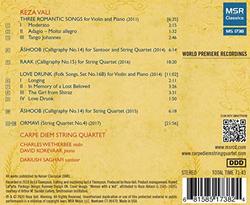| All Artists: Carpe Diem String Quartet, Charles Wetherbee (solo violin), Dariush Saghafi (santoor), David Korevaar (piano) Title: Longing - Chamber Music of Reza Vali | Three Romantic Songs; ¬shoob (Calligraphy No.14, w/ Santoor); Raak (Calligraphy No.15); Love Drunk - Folk Songs, Set 16B; ¬shoob (Calligraphy No.14); Ormavi (Quartet No.4) Members Wishing: 0 Total Copies: 0 Label: MSR Classics Release Date: 10/2/2019 Genre: Classical Style: Chamber Music Number of Discs: 1 SwapaCD Credits: 1 UPC: 681585173824 |
Search - Carpe Diem String Quartet, Charles Wetherbee (solo violin), Dariush Saghafi (santoor) :: Longing - Chamber Music of Reza Vali | Three Romantic Songs; ¬shoob (Calligraphy No.14, w/ Santoor); Raak (Calligraphy No.15); Love Drunk - Folk Songs, Set 16B; ¬shoob (Calligraphy No.14); Ormavi (Quartet No.4)
 | Carpe Diem String Quartet, Charles Wetherbee (solo violin), Dariush Saghafi (santoor) Longing - Chamber Music of Reza Vali | Three Romantic Songs; ¬shoob (Calligraphy No.14, w/ Santoor); Raak (Calligraphy No.15); Love Drunk - Folk Songs, Set 16B; ¬shoob (Calligraphy No.14); Ormavi (Quartet No.4) Genre: Classical Reza Vali's Longing presents the listener with a tantalizing puzzle to decode. As the title suggests, themes of love and desire are intricately threaded throughout a shifting kaleidoscope of forms and aesthetics, framed by... more » |
Larger Image |
CD Details
Synopsis
Product Description
Reza Vali's Longing presents the listener with a tantalizing puzzle to decode. As the title suggests, themes of love and desire are intricately threaded throughout a shifting kaleidoscope of forms and aesthetics, framed by the austerity of Vali's ongoing investigation into the traditions of his Persian musical heritage. The assembled works on this recording create a poly-stylistic tapestry that is on the whole unabashedly honest and exhibits Vali's commitment to expressing his native culture within a Western framework. Equally inspired by some of the great European masters whom he admires and the profound and ancient traditions and figures of his native Iran, Vali has been termed 'the Iranian Bartók' due to his use of folk songs resulting in a distinct musical style, built upon this foundation. Reza Vali was born in Iran in 1952. He began his musical studies at the Conservatory of Music in Tehran and in 1972 traveled to Austria where he studied music education and composition at the Academy of Music. After graduating, he moved to the USA and continued studies at the University of Pittsburgh, where he received his PhD. Vali has been a faculty member of the School of Music at Carnegie Mellon since 1988. He has received numerous honors and commissions, including the honor prize of the Austrian Ministry of Arts and Sciences, two Andrew Mellon Fellowships, commissions from the Pittsburgh Symphony, Boston Modern Orchestra Project, Pittsburgh New Music Ensemble, Kronos Quartet, Carpe Diem String Quartet, Seattle Chamber Players and Arizona Friends of Chamber Music, and grants from the Pennsylvania Council on the Arts, Pittsburgh Foundation and Pittsburgh Board of Education. His chamber works have received performances by Cuarteto Latinoamericano, Pittsburgh New Music Ensemble, Carpe Diem String Quartet, Kronos Quartet, Seattle Chamber Players and Da Capo Chamber Players. His music has been performed around the world and appears on the Deutsche Grammophon, New Albion, Albany and ABC Classics labels. One of the most unique and sought-after chamber ensembles on the concert stage today, the Carpe Diem String Quartet is a boundary-breaking ensemble that has earned widespread critical acclaim. Carpe Diem defies easy classification with programming that includes classical, Gypsy, tango, folk, pop, rock and jazz. The quartet appears on concert series at traditional venues, including Carnegie Hall, Jordan Hall, National Gallery of Art, Chautauqua Institute, Accademia Chigiana and Suntory Hall, as well as many unconventional ones. Carpe Diem has been awarded six transformative grants from the PNC Foundation for their community outreach in Central Ohio. David Korevaar performs an extensive repertoire as a soloist and chamber musician around the United States and internationally. In addition to teaching at the University of Colorado Boulder, where he has been named Distinguished Research Lecturer, he is an active performer and recording artist. In the spring of 2016, Korevaar spent two weeks teaching in Kabul at the Afghanistan National Institute of Music. The 2016-2017 season also included two tours to Brazil and a recital and master classes in Mexico City. In autumn 2017, he conducted and performed two of Mozart's piano concertos in Boulder, a skill he acquired in Japan and Brazil over the last several years. Korevaar's discography includes numerous solo and chamber music recordings. Dariush Saghafi began his study of santoor at age 11 with a leading figure in Persian music. Saghafi was twice the recipient of the Gold Medal in santoor competitions among students from all Iranian colleges and universities and subsequently taught santoor at the Tabriz School of Music in Iran. Saghafi, a recipient of the 2008 Pennsylvania Council on the Arts Fellowship Award in Traditional Art, is a highly respected musician.
